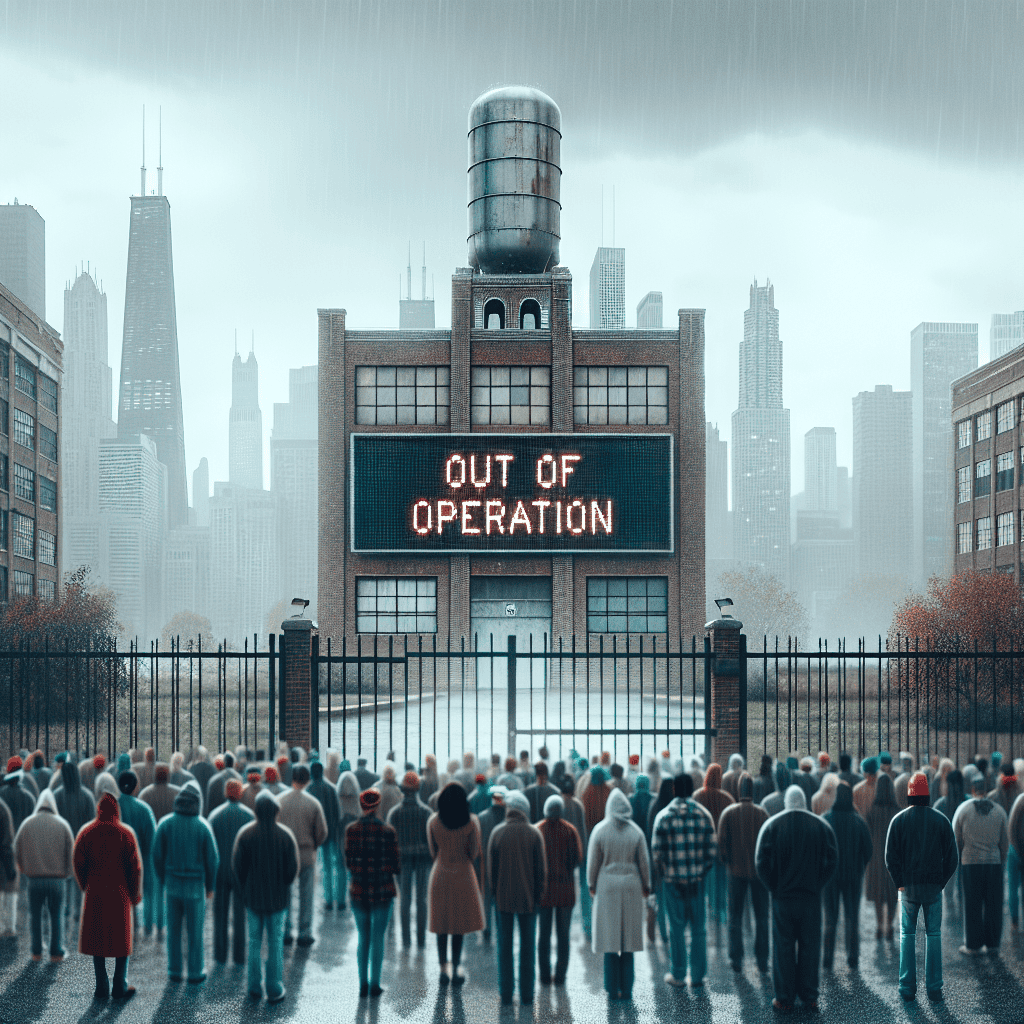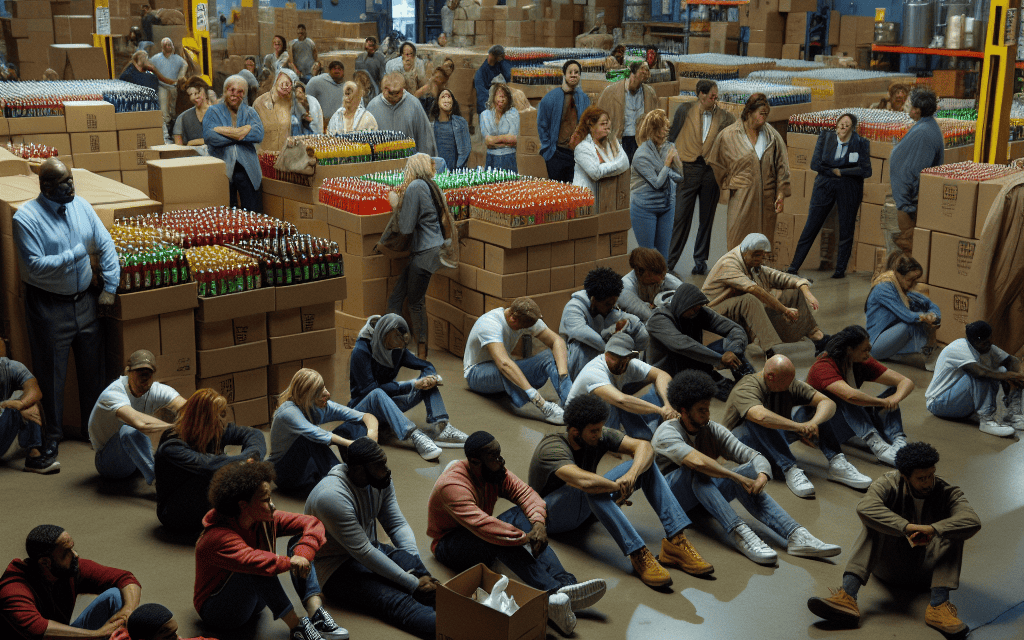“PepsiCo Closure: A Ripple in Chicago, Impacting 150 Lives.”
Introduction
PepsiCo, a global leader in the food and beverage industry, has announced the closure of its bottling plant located in Chicago, a move that will impact approximately 150 employees. This decision is part of the company’s broader strategy to optimize its operations and streamline its supply chain. The Chicago facility, which has been a significant part of PepsiCo’s production network, will cease operations, prompting concerns about job losses and economic implications for the local community. The closure reflects the ongoing challenges and shifts within the industry as companies adapt to changing market demands and operational efficiencies.
Impact Of PepsiCo’s Chicago Plant Closure On Local Economy
PepsiCo’s recent decision to shut down its Chicago bottling plant has sent ripples through the local economy, affecting not only the 150 employees directly employed at the facility but also the broader community that has long relied on the plant’s operations. This closure marks a significant shift in the economic landscape of the area, raising concerns about the immediate and long-term impacts on both the workforce and local businesses. As the plant ceases operations, the immediate consequence is the displacement of 150 workers who now face the challenge of seeking new employment opportunities in an already competitive job market. Many of these employees have dedicated years, if not decades, to PepsiCo, and the sudden loss of their jobs presents a daunting prospect. The closure underscores the vulnerability of workers in industries susceptible to corporate restructuring and highlights the need for robust support systems to aid in their transition to new roles.
Moreover, the plant’s shutdown is likely to have a cascading effect on local businesses that have historically depended on the plant’s operations. Suppliers, service providers, and small businesses in the vicinity may experience a decline in demand, leading to potential revenue losses. This interconnectedness of the local economy means that the impact of the closure extends beyond the plant’s immediate workforce, affecting a wider network of stakeholders. As businesses grapple with the reduced economic activity, there may be a need for strategic interventions to mitigate the adverse effects and support economic resilience in the community.
In addition to the economic implications, the closure raises questions about the future of manufacturing jobs in the region. As companies increasingly seek to optimize operations and cut costs, there is a growing trend towards automation and consolidation, which can lead to job losses in traditional manufacturing sectors. This trend necessitates a reevaluation of workforce development strategies to ensure that workers are equipped with the skills needed for emerging industries. Investment in education and training programs will be crucial in preparing the workforce for the evolving job market and ensuring that they can adapt to new opportunities.
Furthermore, the closure of the Chicago plant reflects broader shifts within PepsiCo’s strategic priorities. As the company seeks to streamline its operations and focus on more profitable ventures, it is likely to continue evaluating its assets and making decisions that align with its long-term goals. While such decisions may be necessary from a business perspective, they also highlight the delicate balance that corporations must maintain between profitability and social responsibility. Engaging with local communities and stakeholders during such transitions can help mitigate negative impacts and foster goodwill.
In conclusion, the closure of PepsiCo’s Chicago bottling plant is a multifaceted issue with significant implications for the local economy. The immediate loss of jobs and the potential ripple effects on local businesses underscore the need for comprehensive support measures to aid affected workers and sustain economic vitality in the region. As the manufacturing landscape continues to evolve, proactive strategies in workforce development and community engagement will be essential in navigating these changes. By addressing these challenges head-on, there is an opportunity to build a more resilient and adaptable local economy that can thrive in the face of future uncertainties.
Employee Reactions To PepsiCo’s Chicago Bottling Plant Shutdown
The recent announcement by PepsiCo to shut down its Chicago bottling plant has sent ripples through the local community, particularly among the 150 employees directly affected by this decision. As the news broke, a mixture of emotions surfaced among the workforce, ranging from shock and disappointment to concern about future employment prospects. This closure, part of a broader strategy by PepsiCo to streamline operations and optimize its supply chain, has left many employees grappling with uncertainty.
For many workers, the plant was more than just a place of employment; it was a community where relationships were built over years of shared experiences. The sudden closure has disrupted not only their professional lives but also their personal connections. Employees have expressed a sense of loss, as the plant was a significant part of their daily routine and identity. The decision has also sparked conversations about the broader implications for the local economy, as the plant’s operations contributed to the economic fabric of the area.
In response to the closure, PepsiCo has stated its commitment to supporting the affected employees through this transition. The company has promised to provide severance packages, career counseling, and job placement assistance to help ease the burden of job loss. However, despite these assurances, many employees remain anxious about their future. The job market, while recovering, still poses challenges, and the prospect of finding new employment in a similar capacity is daunting for some.
Moreover, the closure has prompted discussions about the role of large corporations in local communities and their responsibility towards employees. Critics argue that while companies must make strategic decisions to remain competitive, they should also consider the human impact of such actions. The situation at the Chicago bottling plant underscores the delicate balance between corporate efficiency and employee welfare.
As employees navigate this challenging period, support from local organizations and government agencies will be crucial. Community leaders have already begun to mobilize resources to assist those affected, emphasizing the importance of a coordinated response to mitigate the impact of the closure. Additionally, there is a growing call for initiatives that focus on retraining and upskilling workers to better equip them for new opportunities in an evolving job market.
The closure of the Chicago bottling plant also highlights the broader trends in the manufacturing and beverage industries. As companies increasingly adopt automation and advanced technologies, the demand for traditional manufacturing roles is shifting. This transition presents both challenges and opportunities for workers, who must adapt to new skill requirements and job functions.
In conclusion, the shutdown of PepsiCo’s Chicago bottling plant has had a profound impact on its employees, sparking a range of emotions and concerns about the future. While the company has pledged support, the path forward remains uncertain for many. This situation serves as a reminder of the complex interplay between corporate decisions and their human consequences, underscoring the need for thoughtful strategies that prioritize both business objectives and employee well-being. As the affected workers seek new beginnings, the support of the community and a focus on skill development will be essential in helping them navigate this transition successfully.
Analyzing PepsiCo’s Decision To Close The Chicago Facility
PepsiCo’s recent decision to close its Chicago bottling plant has sent ripples through the local community and the broader business landscape. This move, which affects approximately 150 employees, is part of a strategic realignment by the global beverage and snack giant. Understanding the rationale behind this decision requires a closer examination of the factors influencing PepsiCo’s operational strategies and the potential implications for both the company and its workforce.
To begin with, the closure of the Chicago facility is not an isolated incident but rather a component of PepsiCo’s broader effort to optimize its supply chain and improve operational efficiency. In recent years, the company has been focusing on streamlining its production processes to better align with shifting consumer preferences and market demands. By consolidating operations, PepsiCo aims to reduce costs and enhance its competitive edge in an industry that is increasingly driven by innovation and agility.
Moreover, the decision to shut down the Chicago plant can be seen as a response to the evolving dynamics of the beverage market. With consumers gravitating towards healthier options and more diverse product offerings, traditional bottling operations face mounting pressure to adapt. PepsiCo has been investing heavily in expanding its portfolio to include a wider range of beverages, such as low-calorie drinks, flavored waters, and plant-based options. Consequently, the company is reallocating resources to facilities that are better equipped to produce these new products, thereby ensuring that it remains at the forefront of industry trends.
In addition to market considerations, economic factors have also played a significant role in PepsiCo’s decision-making process. The cost of maintaining and operating older facilities can be substantial, particularly in urban areas like Chicago where real estate and labor expenses are high. By closing the plant, PepsiCo can redirect its financial resources towards more modern and cost-effective production sites, ultimately bolstering its bottom line. This strategic shift is indicative of a broader trend among multinational corporations seeking to optimize their global operations in an increasingly competitive environment.
While the closure of the Chicago bottling plant is a calculated business decision, it inevitably has profound implications for the affected employees and the local community. The loss of approximately 150 jobs is a significant blow, particularly in a city that has been grappling with economic challenges. PepsiCo has stated that it will provide support to the displaced workers, including severance packages and assistance with job placement. However, the transition may still be difficult for many, underscoring the broader societal impact of corporate restructuring initiatives.
In conclusion, PepsiCo’s decision to close its Chicago bottling plant is a multifaceted one, driven by a combination of market trends, economic considerations, and strategic priorities. While the move aligns with the company’s long-term goals of enhancing efficiency and staying competitive, it also highlights the challenges faced by employees and communities in the wake of corporate realignments. As PepsiCo continues to evolve in response to changing consumer preferences and industry dynamics, it will be crucial for the company to balance its business objectives with a commitment to social responsibility and support for its workforce.
Future Prospects For Displaced Workers After PepsiCo’s Closure

The recent announcement of PepsiCo’s decision to shut down its Chicago bottling plant has sent ripples through the local community, particularly affecting the 150 employees who will soon find themselves without jobs. This closure, part of a broader strategy to optimize operations and reduce costs, underscores the challenges faced by workers in an ever-evolving economic landscape. As these employees grapple with the immediate impact of job loss, it is crucial to explore the future prospects available to them and the resources that can facilitate their transition into new roles.
In the wake of such closures, displaced workers often face uncertainty and anxiety about their future employment opportunities. However, it is important to recognize that this situation, while challenging, also presents an opportunity for growth and reinvention. The first step for these workers is to assess their current skills and identify areas where they can enhance their employability. Many industries, particularly those in technology and healthcare, are experiencing growth and may offer viable career paths for those willing to undergo retraining or upskilling.
To support this transition, various programs and resources are available to assist displaced workers. Local government agencies, in collaboration with educational institutions, often provide retraining programs tailored to meet the demands of the current job market. These programs can equip workers with new skills, making them more competitive candidates for emerging job opportunities. Additionally, career counseling services can offer guidance on resume building, interview preparation, and job search strategies, further aiding in the transition process.
Moreover, networking plays a crucial role in finding new employment. Displaced workers are encouraged to leverage professional networks, both online and offline, to connect with potential employers and industry peers. Platforms such as LinkedIn can be invaluable in this regard, allowing individuals to showcase their skills and experience while engaging with industry-specific groups and discussions. By actively participating in these networks, workers can gain insights into job openings and industry trends, thereby enhancing their chances of securing new positions.
While the closure of the PepsiCo plant is undoubtedly a setback for the affected employees, it is also an opportunity for the community to rally together and support those in need. Local businesses and organizations can play a pivotal role by offering job fairs, workshops, and other initiatives aimed at connecting displaced workers with potential employers. Community support can foster a sense of solidarity and provide a safety net for those navigating this challenging period.
In addition to local efforts, it is essential for policymakers to consider the broader implications of such closures and to implement measures that support workforce development and economic resilience. By investing in education and training programs, governments can help ensure that workers are equipped with the skills needed to thrive in a rapidly changing economy. Furthermore, policies that encourage business growth and innovation can create new job opportunities, ultimately benefiting both displaced workers and the community at large.
In conclusion, while the closure of PepsiCo’s Chicago bottling plant presents significant challenges for the 150 affected employees, it also opens the door to new opportunities. By taking advantage of available resources, engaging in retraining and upskilling, and leveraging professional networks, displaced workers can navigate this transition successfully. With the support of local communities and proactive policy measures, these individuals can look forward to a future that holds promise and potential.
Community Response To PepsiCo’s Chicago Plant Shutdown
The recent announcement by PepsiCo to shut down its Chicago bottling plant has sent ripples through the local community, affecting not only the 150 employees directly impacted by the closure but also the broader economic and social fabric of the area. This decision, part of a strategic realignment by the beverage giant, underscores the complex interplay between corporate strategy and community welfare. As the news broke, it became evident that the ramifications of this closure extend far beyond the immediate loss of jobs, prompting a multifaceted response from various stakeholders.
Initially, the employees at the Chicago plant, many of whom have dedicated years of service to PepsiCo, expressed a mix of shock and disappointment. For these workers, the plant was more than just a place of employment; it was a community hub where relationships were forged and a sense of belonging was cultivated. The sudden announcement has left many grappling with uncertainty about their future, as they face the daunting task of seeking new employment in an already competitive job market. In response, local labor unions have stepped in to provide support, advocating for fair severance packages and assistance in job placement to help ease the transition for affected workers.
Moreover, the closure has prompted a broader discussion about the economic impact on the surrounding community. The plant’s operations contributed significantly to the local economy, not only through direct employment but also by supporting ancillary businesses such as suppliers and service providers. With the plant’s shutdown, these businesses may experience a decline in demand, potentially leading to further job losses and economic strain. Community leaders and local government officials are now tasked with devising strategies to mitigate these effects, exploring opportunities for economic diversification and investment in new industries to revitalize the area.
In addition to economic concerns, the plant’s closure has sparked conversations about corporate responsibility and the role of large companies in supporting the communities in which they operate. Critics argue that PepsiCo, as a major multinational corporation, has a duty to consider the social implications of its business decisions and to engage in meaningful dialogue with affected communities. In response, PepsiCo has stated its commitment to working with local stakeholders to address the challenges arising from the closure, including exploring potential redevelopment opportunities for the site and investing in community programs.
As the community grapples with the immediate consequences of the plant’s shutdown, there is also a sense of resilience and determination to move forward. Local organizations and community groups have rallied together, offering support and resources to those affected. Initiatives such as job fairs, skills training programs, and financial counseling are being organized to help displaced workers navigate this challenging period. Furthermore, there is a growing emphasis on fostering entrepreneurship and innovation within the community, with the aim of creating new opportunities and building a more sustainable economic future.
In conclusion, the closure of PepsiCo’s Chicago bottling plant serves as a poignant reminder of the intricate relationship between corporate actions and community well-being. While the immediate impact is undeniably challenging, the collective response from employees, local leaders, and community members highlights a shared commitment to overcoming adversity and forging a path toward recovery and renewal. As the community continues to adapt and evolve, the lessons learned from this experience will undoubtedly shape its future trajectory, underscoring the importance of collaboration and resilience in the face of change.
Historical Significance Of The Chicago Bottling Plant In PepsiCo’s Operations
The recent announcement of PepsiCo’s decision to shut down its Chicago bottling plant marks the end of an era for a facility that has played a significant role in the company’s operations for decades. This closure, which affects 150 employees, is not just a business decision but also a moment of reflection on the historical significance of the plant within PepsiCo’s expansive network. The Chicago bottling plant has been a cornerstone in the company’s distribution and production strategy, contributing to the brand’s growth and presence in the Midwest region.
Established in the mid-20th century, the Chicago plant was strategically located to serve as a hub for PepsiCo’s operations in the central United States. Its location allowed for efficient distribution channels, ensuring that Pepsi products could reach a wide array of markets swiftly. Over the years, the plant became synonymous with innovation and efficiency, often serving as a testing ground for new production techniques and technologies. This facility was not only pivotal in meeting the growing demand for Pepsi products but also in setting standards for quality and sustainability within the industry.
Moreover, the Chicago bottling plant has been instrumental in fostering community relationships and providing employment opportunities. For many residents, the plant was more than just a workplace; it was a part of the community’s identity. Generations of families have worked within its walls, contributing to a sense of pride and belonging. The plant’s closure, therefore, resonates deeply, not only as an economic shift but as a cultural and social change for the local community.
Transitioning to the broader implications, the closure of the Chicago plant reflects the evolving landscape of the beverage industry. PepsiCo, like many other global corporations, is continually adapting to changing market demands, technological advancements, and sustainability goals. The decision to shut down this facility is part of a larger strategy to optimize operations and focus on more modern, efficient production methods. While this move aligns with the company’s long-term objectives, it also underscores the challenges faced by traditional manufacturing sites in keeping pace with rapid industry transformations.
In addition, the closure highlights the increasing importance of sustainability in corporate decision-making. PepsiCo has been actively pursuing initiatives to reduce its carbon footprint and enhance resource efficiency. By consolidating operations and investing in state-of-the-art facilities, the company aims to achieve its environmental targets more effectively. This strategic shift, while necessary for future growth, inevitably leads to difficult decisions regarding older plants that may not meet the new sustainability criteria.
As we consider the historical significance of the Chicago bottling plant, it is essential to acknowledge its contributions to PepsiCo’s legacy. The plant has been a testament to the company’s resilience and adaptability, navigating through various economic cycles and industry changes. Its closure marks a significant transition point, prompting reflection on past achievements while looking forward to future innovations.
In conclusion, the shutdown of PepsiCo’s Chicago bottling plant is a multifaceted event with historical, economic, and social dimensions. It serves as a reminder of the plant’s vital role in the company’s history and the broader beverage industry. As PepsiCo continues to evolve, the legacy of the Chicago plant will remain an integral part of its journey, symbolizing both the challenges and opportunities that come with progress and change.
Exploring PepsiCo’s Strategic Shift Leading To The Plant Closure
PepsiCo’s recent decision to shut down its Chicago bottling plant marks a significant shift in the company’s strategic operations, reflecting broader trends in the beverage industry. This closure, which affects approximately 150 employees, is part of PepsiCo’s ongoing efforts to streamline its operations and adapt to changing market demands. The decision underscores the company’s focus on optimizing its supply chain and enhancing efficiency across its production facilities.
The Chicago plant, which has been a staple in the local community for years, played a crucial role in PepsiCo’s regional distribution network. However, as consumer preferences evolve and the demand for traditional carbonated beverages declines, PepsiCo has been compelled to reassess its production strategies. This reassessment is not unique to PepsiCo; it mirrors a wider industry trend where beverage companies are increasingly prioritizing innovation and diversification in their product lines. As a result, PepsiCo has been investing in new product categories, such as healthier beverage options and non-carbonated drinks, to capture a broader consumer base.
In light of these shifts, the closure of the Chicago plant can be seen as a strategic move to reallocate resources more effectively. By consolidating production in more modern and efficient facilities, PepsiCo aims to reduce operational costs and improve its competitive edge. This approach aligns with the company’s long-term vision of achieving sustainable growth and maintaining its leadership position in the global beverage market. Moreover, the closure is part of a broader restructuring initiative that PepsiCo has been implementing over the past few years, which includes investing in technology and automation to enhance productivity.
While the decision to close the plant is a strategic one, it inevitably has significant implications for the affected employees and the local community. PepsiCo has stated that it is committed to supporting the impacted workers by providing severance packages and offering assistance in finding new employment opportunities. The company is also working closely with local authorities and community organizations to mitigate the impact of the closure. Despite these efforts, the loss of jobs is a challenging reality for many families, highlighting the broader economic shifts that are reshaping industries across the globe.
Furthermore, the closure of the Chicago plant raises questions about the future of manufacturing jobs in the beverage industry. As companies like PepsiCo continue to embrace automation and digitalization, the demand for traditional manufacturing roles is likely to decrease. This trend underscores the importance of workforce retraining and upskilling initiatives to prepare employees for the evolving job market. By investing in education and skill development, companies and governments can help ensure that workers are equipped to thrive in a rapidly changing economic landscape.
In conclusion, PepsiCo’s decision to shut down its Chicago bottling plant is a reflection of the company’s strategic shift towards greater efficiency and innovation. While the closure is part of a broader industry trend, it also highlights the challenges faced by employees and communities in adapting to these changes. As PepsiCo continues to navigate the complexities of the modern beverage market, its ability to balance operational efficiency with social responsibility will be crucial in shaping its future success.
Q&A
1. **What happened to the PepsiCo bottling plant in Chicago?**
PepsiCo decided to shut down its bottling plant in Chicago.
2. **How many employees are affected by the closure?**
The closure affects approximately 150 employees.
3. **Why did PepsiCo decide to close the Chicago bottling plant?**
The specific reasons for the closure have not been publicly detailed, but such decisions are often due to strategic business considerations, such as cost-cutting, restructuring, or shifting operations to other locations.
4. **When was the closure announced?**
The exact date of the announcement is not specified, but it was reported in recent news.
5. **What will happen to the employees affected by the closure?**
PepsiCo typically offers severance packages, job placement assistance, or opportunities to transfer to other facilities, but specific details for these employees have not been disclosed.
6. **Is PepsiCo closing other plants as well?**
There is no information provided about other plant closures at this time.
7. **What impact will this closure have on PepsiCo’s operations?**
The impact on operations is not specified, but such closures are usually intended to streamline operations and improve efficiency.
Conclusion
PepsiCo’s decision to shut down its Chicago bottling plant has significant implications, primarily affecting the 150 employees who will lose their jobs. This closure reflects broader strategic shifts within the company, possibly aimed at optimizing operations and reducing costs. The move may also impact the local economy, as the plant likely contributed to the community through employment and economic activity. For the affected workers, this development necessitates seeking new employment opportunities, potentially requiring retraining or relocation. Overall, the closure underscores the challenges faced by large corporations in balancing operational efficiency with workforce stability.





